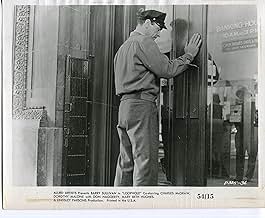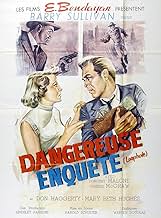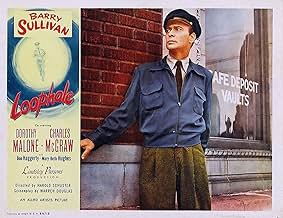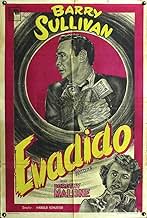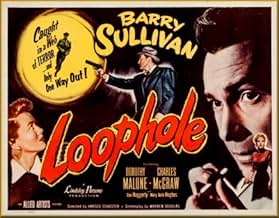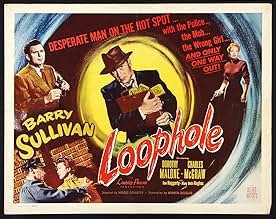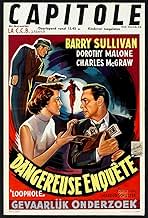अपनी भाषा में प्लॉट जोड़ेंA bank teller attempts to clear his name and rebuild his career after he is wrongly accused of theft.A bank teller attempts to clear his name and rebuild his career after he is wrongly accused of theft.A bank teller attempts to clear his name and rebuild his career after he is wrongly accused of theft.
- निर्देशक
- लेखक
- स्टार
John Close
- FBI Agent
- (बिना क्रेडिट के)
Tom Coleman
- Bank Examiner
- (बिना क्रेडिट के)
Hal K. Dawson
- Mr. Johnson - Bank Examiner
- (बिना क्रेडिट के)
Sayre Dearing
- Bank Employee
- (बिना क्रेडिट के)
George Eldredge
- Policeman
- (बिना क्रेडिट के)
Charles Ferguson
- Bank Examiner
- (बिना क्रेडिट के)
Sam Flint
- Sam - Bank Guard
- (बिना क्रेडिट के)
Don C. Harvey
- Police Detective
- (बिना क्रेडिट के)
- …
फ़ीचर्ड समीक्षाएं
This is a pretty interesting tale of an average Joe bank teller who is wrongly accused of masterminding a robbery at his bank. The story moves along, the acting is good, and the direction is adept. The movie really ignites flames when CHARLES MACGRAW, as a vengeful bail bondsman, and MARY BETH HUGHES, as a platinum blond femme fatale, are on screen. They both light up the screen with their world-wary, jaded, magnetism. I wish the film had been about them instead of rather dull BARRY SULLIVAN. And DOROTHY MALONE is wasted as the dutiful, loyal wife. In one particularly cringe-worthy scene, Sullivan's boss, Jim Starling (DAYTON LUMMIS), physically hold up his hand up to shush Malone when she tries to make a suggestion, and barks, "I'll handle this, Ruthie." That about sums up how Malone's character was written. Don Beddoe is great as the mild-mannered bank teller in over his head with Hughes, and Richard Reeves is a scene-stealer as Sullivan's new boss who has no time for MacGraw!
Barry Sullivan is the chief teller at a bank branch. Checking his figures at the end of the day, he comes up $50,000 short. He rechecks, and goes home to wife Dorothy Malone and his dog, and tells her what happened. She knows he should have reported the shortage before he went home. He tells his boss the first thing Monday, and the bonding company is told. They send Charles McGraw to investigate, and plays tough, finally dragging Sullivan and Miss Malone to the police station. The cops believe Sullivan, who remembers that the auditors had come by in the morning, and had done something odd, asking to recheck the big bills. They send Sullivan home, and try to figure out who the auditor was. Not McGraw. He believes Sullivan did it, and starts hounding him. Sullivan loses his bond and goes through a series of small jobs, each of which McGraw gets him fired from. When Sullivan gets a job at Richard Reeves' can company, he tells McGraw that as long as Sullivan keeps his nose clean, he'll keep his job until he goes to jail.
McGraw is brilliant as the brutal investigator, convinced he is Inspector Javert and suggesting the cops third-degree Sullivan. Miss Malone is the dutiful wife, a couple of years before she would win an Oscar.Don Beddoe, one of those familiar faces from hundreds of movies, is fine as the actual thief, and peroxided Mary Beth Hughes is fine as the viperish dame who has Beddo on the hook.
It's a fine shaky A production from Allied Artists that makes the most of its cast and script, an exercise in the tawdry underworld that Sullivan and perky Dorothy Malone fall into when suspicion falls on them.
McGraw is brilliant as the brutal investigator, convinced he is Inspector Javert and suggesting the cops third-degree Sullivan. Miss Malone is the dutiful wife, a couple of years before she would win an Oscar.Don Beddoe, one of those familiar faces from hundreds of movies, is fine as the actual thief, and peroxided Mary Beth Hughes is fine as the viperish dame who has Beddo on the hook.
It's a fine shaky A production from Allied Artists that makes the most of its cast and script, an exercise in the tawdry underworld that Sullivan and perky Dorothy Malone fall into when suspicion falls on them.
I loved "Loophole", and the film has many things going for it. The story is much like a variation on "Les Misérables" and "The Fugitive" and much of it is because the story seems so real.
When the story begins, Mike Donovan (Barry Sullivan) is a well respected head teller at a bank. However, his reputation is destroyed when a group of bank examiners arrive to check on the bank...a standard procedure. What is NOT standard is that one of these examiners is a phony...a guy using this situation to steal from the bank. And, unfortunately for Mike, the crook steals from his cash box. And, when the bank is $50,000 short, he's in deep trouble with the law.
After investigating, the police find no money nor any proof that Mike stole anything...and they believe he's innocent. However, a security officer from the bank's head office, Gus Slavin (Charles McGraw), has assumed from the start that Mike is a crook...and even after the police release Mike, Guy persecutes him--following him everywhere and getting him fired from many jobs*. After a while, it's obvious the only chance Mike has is to find the real crooks himself.
This films works for two main reasons. First, Donovan is so likable and 'normal' that you really sympathize with the guy. Second, and more important, Gus is just scum....as bad as Javert from "Les Misérables". He's humorless, mean and a punk....and McGraw was wonderful here and in many other films. There just weren't many actors who could pull the role off like he did...plus the writing really helped. Overall, an exceptional crime film...and one that you really must see.
*My assumption is that much of Gus' actions in the film would not be the least bit legal in 2021....especially going to employers and telling them that Mike is a thief and should be fired.
When the story begins, Mike Donovan (Barry Sullivan) is a well respected head teller at a bank. However, his reputation is destroyed when a group of bank examiners arrive to check on the bank...a standard procedure. What is NOT standard is that one of these examiners is a phony...a guy using this situation to steal from the bank. And, unfortunately for Mike, the crook steals from his cash box. And, when the bank is $50,000 short, he's in deep trouble with the law.
After investigating, the police find no money nor any proof that Mike stole anything...and they believe he's innocent. However, a security officer from the bank's head office, Gus Slavin (Charles McGraw), has assumed from the start that Mike is a crook...and even after the police release Mike, Guy persecutes him--following him everywhere and getting him fired from many jobs*. After a while, it's obvious the only chance Mike has is to find the real crooks himself.
This films works for two main reasons. First, Donovan is so likable and 'normal' that you really sympathize with the guy. Second, and more important, Gus is just scum....as bad as Javert from "Les Misérables". He's humorless, mean and a punk....and McGraw was wonderful here and in many other films. There just weren't many actors who could pull the role off like he did...plus the writing really helped. Overall, an exceptional crime film...and one that you really must see.
*My assumption is that much of Gus' actions in the film would not be the least bit legal in 2021....especially going to employers and telling them that Mike is a thief and should be fired.
You know in five minutes how this film will end. But it is the journey, not reaching the destination that is the best part of this low-budget film noir piece. Barry Sullivan is miscast as a banker who has a bad day at the office. But Mcgraw is letter perfect in his Edward G imitation of "Double Indemnity". He plays the hard-nosed bond detective to a tee. The females do well in this film, also. I love the bank robber's moll, who was as evil as they get, and the good girl was predictably played well by good girl Dorothy Malone, who always suffered during love scenes (she could never convince the audience she was overtly sexy). She is fine in this role, however. Sullivan, who was famous for uttering one of the most famous lines that ever slipped through the censors in Hollywood with Barbara Stanwyck in "Forty Guns", when he tells Stanwyck that "she better not play with his gun or it might go off in her face". How the hell did that get through? Anyway, the direction is interesting and the production values are wretched, but somehow, the film works anyway. The idea is quite clever at the beginning. A watchable noir.
Very implausible plot. What bank is ever inspected by a team of auditors in this way who just suddenly turn up to count the money in each teller's drawer? And wouldn't the teller be casting a careful eye over what the "inspector" was doing, no matter how busy he was? Very odd.
क्या आपको पता है
- ट्रिवियाThe house on Westward Beach Rd., Westward Beach, Malibu (CA), in the final scenes also appears in the final scenes of Kiss Me Deadly (1955) and What Ever Happened to Baby Jane? (1962).
- गूफ़When Donovan drives away from the telephone booth on the road to the Malibu beach-house the camera and cameraman are reflected in the window of his cab.
टॉप पसंद
रेटिंग देने के लिए साइन-इन करें और वैयक्तिकृत सुझावों के लिए वॉचलिस्ट करें
विवरण
- रिलीज़ की तारीख़
- कंट्री ऑफ़ ओरिजिन
- भाषा
- इस रूप में भी जाना जाता है
- Лазейка
- फ़िल्माने की जगहें
- उत्पादन कंपनी
- IMDbPro पर और कंपनी क्रेडिट देखें
- चलने की अवधि1 घंटा 20 मिनट
- रंग
इस पेज में योगदान दें
किसी बदलाव का सुझाव दें या अनुपलब्ध कॉन्टेंट जोड़ें



